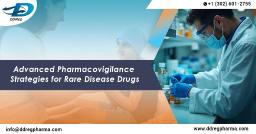

Rare diseases, also known as orphan diseases, are conditions that affect fewer than 5 in 10,000 people in Europe or fewer than 200,000 people in the United States. While each rare disease impacts a small group of individuals, collectively, these conditions affect over 350 million people globally and can significantly reduce a patient’s quality of life. This underscores the critical need to monitor the safety of treatments for orphan drugs and calls for innovative pharmacovigilance strategies to ensure both patient safety and continued medical progress.
As regulatory frameworks evolve and patient advocacy grows, pharmaceutical companies must adopt advanced pharmacovigilance services methodologies to address the unique risks and benefits associated with treatments for rare diseases.
Rare diseases are characterized by limited patient populations, which present significant challenges in both clinical research and post-market monitoring:
Data Integration and Real-World Evidence (RWE) Collection
Real-world data (RWD) from sources such as patient registries, electronic health records (EHRs), and digital platforms can help identify long-term adverse effects and rare safety signals that may not appear in clinical trials.
Example: Real-world data has been used to monitor enzyme replacement therapies (ERT) for lysosomal storage disorders, revealing safety issues that become apparent with prolonged use.
Adaptive Clinical Trial Designs
Traditional randomized controlled trials (RCTs) often face limitations in rare diseases due to small patient populations and ethical concerns. Innovative trial designs like Bayesian frameworks, N-of-1 trials, and adaptive designs offer solutions to these challenges. These approaches optimize data collection while accommodating the unique characteristics of rare diseases. However, even with adaptive designs, clinical trials for rare disease drugs frequently report higher rates of adverse events than those for non-orphan drugs, highlighting the importance of vigilant safety monitoring.
Post-Marketing Surveillance
Post-market pharmacovigilance programs for rare diseases should incorporate:
Utilizing Artificial Intelligence (AI) and Machine Learning (ML)
AI and ML can significantly enhance the detection of safety signals and risk assessment by efficiently analyzing large and complex datasets. Global collaboration through organizations like the National Organization for Rare Disorders (NORD) and the European Organization for Rare Diseases (EURORDIS) strengthens safety evaluations by facilitating patient recruitment and encouraging cross-border data sharing. Additionally, digital platforms enable patients to report outcomes directly, offering invaluable real-world insights into drug effects and further enhancing the pharmacovigilance services in usa.
For More read our Blog post - https://resource.ddregpharma.com/blogs/advanced-pharmacovigilance-strategies-for-rare-disease-drugs/
To get the daily updates, follow us on:
Facebook — https://www.facebook.com/DDReg
LinkedIn — https://www.linkedin.com/company/ddregpharma/
Twitter — https://x.com/DDRegPharma
Instagram — https://www.instagram.com/ddregpharma/
| No comments yet. Be the first. |